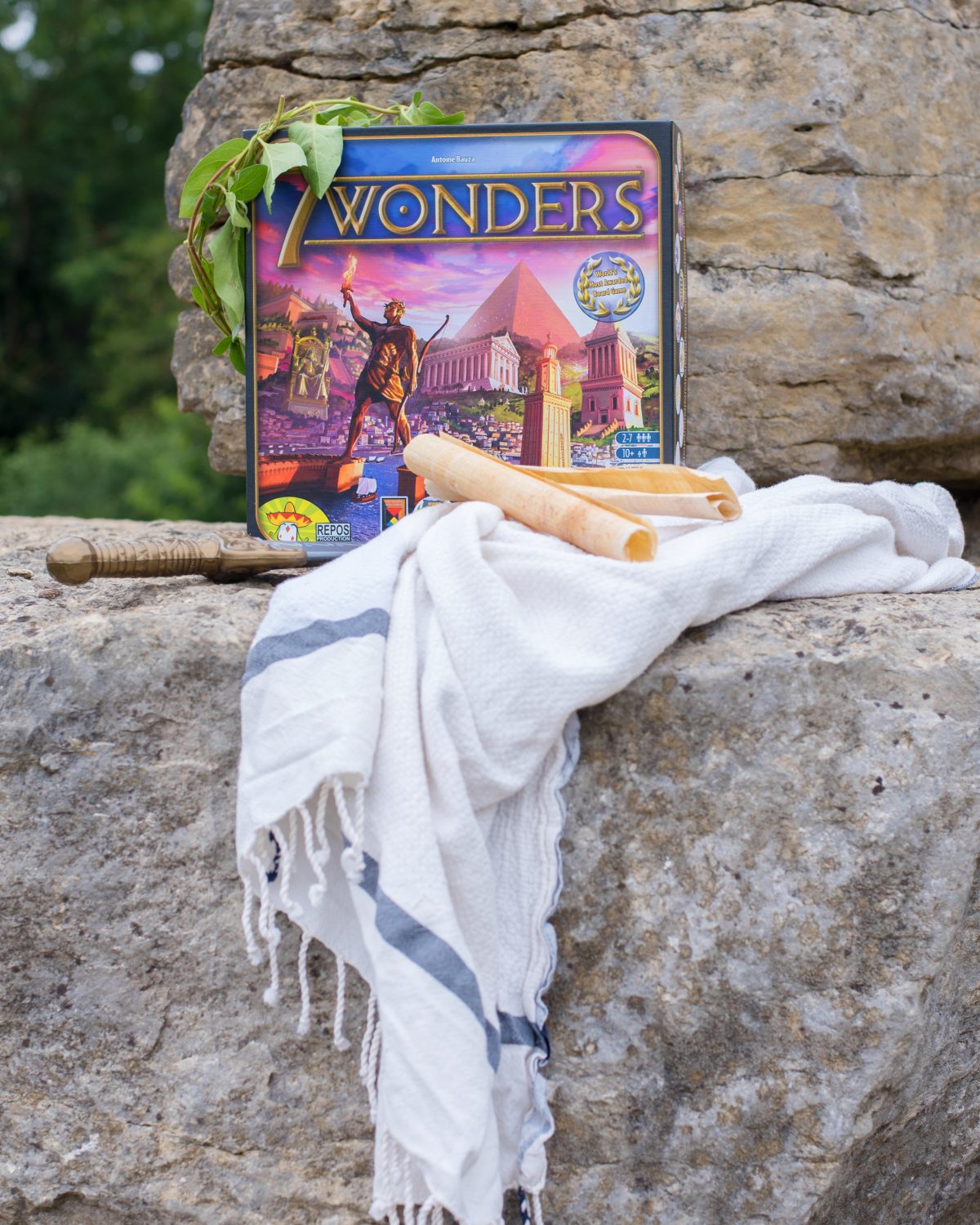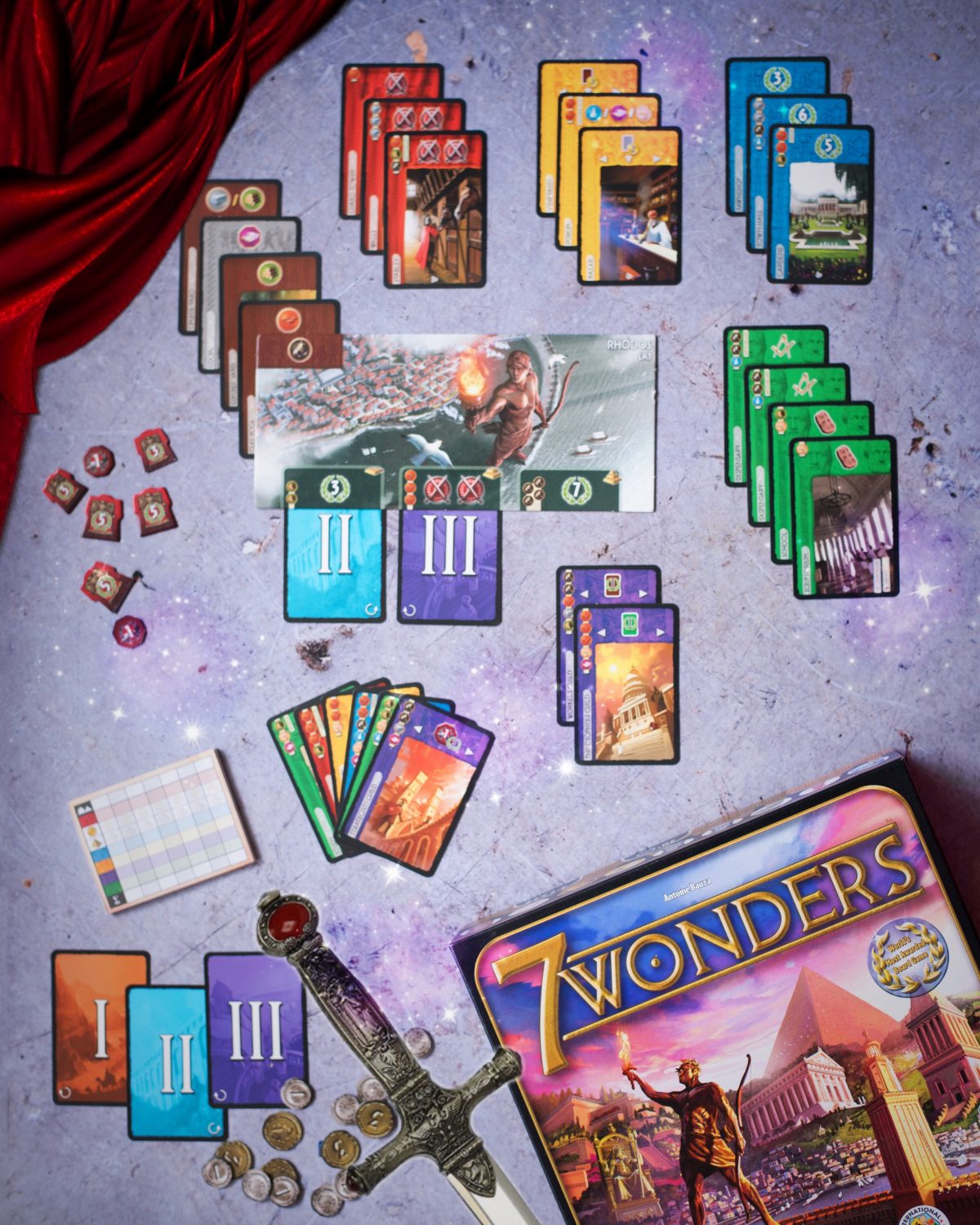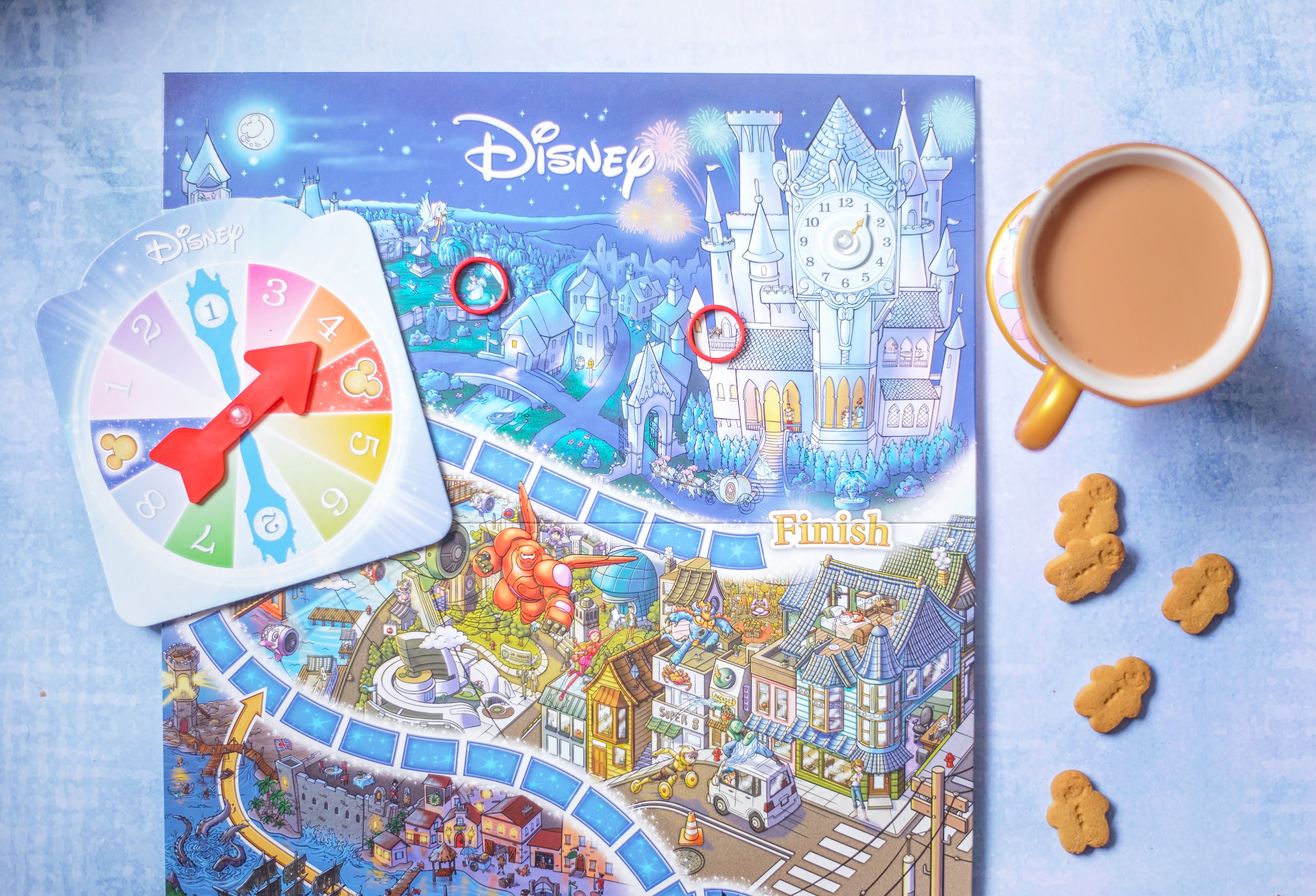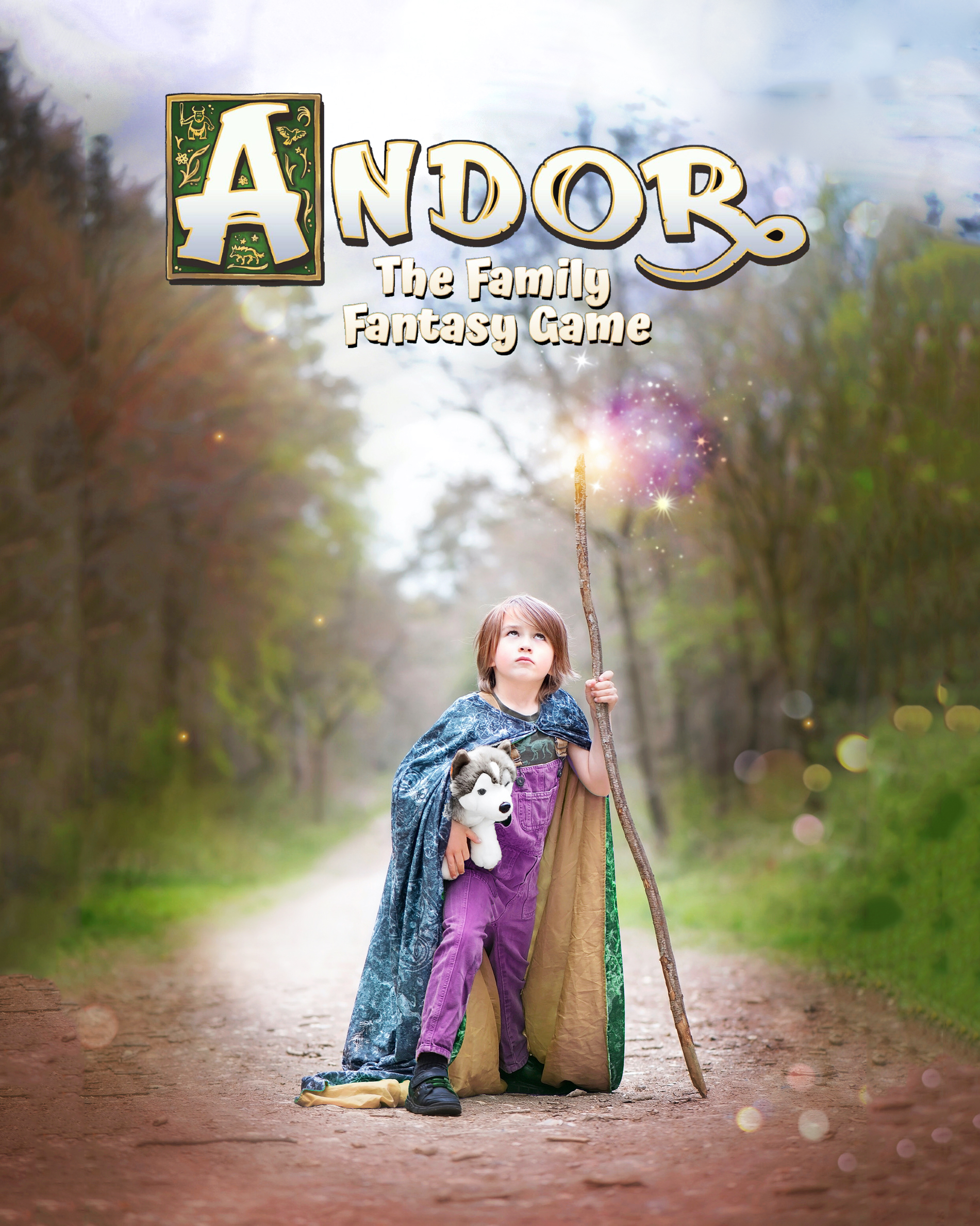7 WONDERS [ASMODEE UK BOARD GAMES CLUB]
This is a collaboration with Asmodee UK. We were compensated for creating this post about the 7 Wonders Board Game.
Click here for our Toy Review Catalogue to read our reviews before you buy!
Before we start this review, I just want to say a huge thank you to Jensen, our oldest son, for his all round good sportsmanship in helping with this review. For standing in the park, in a toga, with leaves in his hair and a chip cone in his hand whilst children stared at him in confusion – all in the name of creativity. Cheers, Jens. We love you.

7 Wonders Board Game
Prepare yourself. It’s here.
7 Wonders, “The World’s Most Awarded Board Game” arrived on our doorstep a few weeks ago.
Yes, the WORLD. Let’s face it, when there’s a box with a label carrying a claim like that staring you in the face, you’re going to be falling over yourself with rabid curiosity at just what makes it so special to play.
The 7 Wonders Board Game is created by the super talented Antoine Bauza, the designer of a long list of titles which are very well regarded in the board gaming community, including Ghost Stories and Takenoko [see our Takenoko review here]. Originally published in 2010, it’s still going strong, racking up the accolades, sitting proudly on game shelves across the globe and snagging itself the title of World’s Most Awarded Board Game.
This game casts you as: a Great Leader of an ancient civilisation, an Ambitious Architect of a prosperous city, and a Mighty Military General … nervously glancing at your rivals as their power and influence grows.
Yes, the game is designed as an exercise in civilisation building, where players each have to recreate one of the great cities of the world from an ancient culture. Each player takes on one of the Seven Wonders of the World which is identified upon their individual game board. As they go about constructing their city throughout three Ages, the winner is the one to finish with the most victory points – which are earned through employing a variety of different strategies.
What’s slightly more unusual about 7 Wonders than most games we’ve played is that it supports a playing group of 2-7 players. That’s right, Attila [I like to get into character, early doors], 2-7. This is one of the very rare games which has this broad range of player counts but still keeps the game to a very reasonable 30 – 45 minutes play time [once the players are familiar with the game].
What needs to be said though, is that although 7 Wonders does indeed support 2 players, we’ve found it really shines at 3 or more. However, if like us, your game time is often restricted to after you’ve wrestled the kids into bed, thrown your dinner into your belly, and you’re racing against the clock in order to get in some game time before your eyes give in and close on you, then you need to break out a 2 player game. Coming to your rescue in these circumstances is the extremely highly rated 7 Wonders: Duel, by the same designer, which distills the game down into a very strategic 2 player version.

WE BUILT THIS CITY
So the epic task of building an entire civilisation which falls at the feet of each player entering the game might sound an almighty feat; but thankfully, it’s easier than it sounds. Quicker than you can say, “I came, I saw, I conquered”, you’re picking and choosing, selecting and laying the infrastructure and achievements of your ever-expanding empire by way of little card rectangles. No sweat.
WONDER BOARDS
The game kicks off with each player deciding on a ‘Wonder Board’ to use. What is a Wonder Board I hear you cry? Nothing to do with Wonder Woman sadly, although I did spend quite a bit of time trying to fit in a Wonder Woman joke here to no avail.
The Wonder Board is simply an individual player board which adds a beautifully illustrated thematic touch to the game by depicting one of the 7 Wonders of the World and the associated ancient city that the player has the option of building during the course of the game. For example, a player may be creating a great Egyptian civilisation which comes with the option of building the Pyramids of Giza, or maybe they prefer hanging out in Ancient Greece constructing a statue of the great Zeus in Olympia.
Each Wonder Board gives a player a solitary and rather meagre starting resource. Yes, this is another game where you must manage the basic building blocks of civilisation itself – this time not only in the form of raw materials such as wood and clay, but also the more advanced resources [in terms of the ancient world’s take on advancement anyway] such as glass or papyrus. If you meet Gav in real life, never mention papyrus to him. He spent an early Egyptian obsessed school year believing he had a real framed papyrus on the wall in his bedroom and is still disgusted to this day that when he went to reframe it, he discovered it was just a print he’d idolised and not the real thing. Stifled laugh

BUILDING BLOCKS AWAY!
Anyhow, papyrus forgeries aside, the first step on the path to construction greatness in 7 Wonders is choosing cards which provide additional resources to players with which they can build. Once selected, these cards are stacked up in a tableau to the left hand side of each player’s Wonder Board allowing players to start building more advanced structures as the game goes on.
CARD DRAFTING IN THE 7 WONDERS BOARD GAME
The main mechanism and secret weapon of 7 Wonders is “card drafting”. Each turn players must select one card from those available to them. That’s it!
Instead of the normal situation of most games where players take it in turns to select cards, the usual central shared marketplace of cards is missing-in-action. In 7 wonders, each player begins with a hand of cards, and they select just one and pass the rest onto their neighbour. In return they then receive a fresh hand from the neighbour on the other side who has just picked one card from that hand. Basically, as long as you’re passing to and receiving from different sides, it’s all good.
All players draft simultaneously from a hand which means that each turn simply involves choosing one card and deciding how to use it. Play happens much more quickly as everyone is involved in the game at all times. There’s no waiting for your turn to come around – which I love, as I’m horribly impatient with deep thinking players and my mind starts to wonder, I mean, wander.
Card drafting is a mechanism that we’ve seen before in lighter games such as Sushi Go [LOVE that game], but it’s a clever addition to this slightly more complex game as it really keeps the game moving and the overall playing time much shorter than it otherwise would be.

HOLDING ALL THE CARDS
So you’ve selected a card. What next on your road to greatness? After selecting, there are three things you can do:
Build – you can build that card into your city by placing it down in front of you
Flip – flip it over and use it as payment for beginning construction on your Wonder
Sell – sell it to the bank by discarding it and taking coins in exchange
ALL ABOUT THE MONEY
Hold your war horses there one minute, Ghengis! Building stuff doesn’t come for free. Each card requires a different set of resources in order to persuade your minions to get to work and add it to your city. Some buildings require hard cold cash in the form of coins to the bank others require a combination of different raw materials.
And when we’re looking at the resources in this game, there’s no fiddly accounting with teeny counters – another ingenious feature of this game is that the raw materials available to you for production and construction are displayed readily in your city on the cards you’ve already laid. There’s no need to constantly collect each wood, glass, or other resource – the cards you have are reusable and renewable. So, if you need stone to build your wonder and you have a card with a little stone on it, it’s there each turn ready for use, like a quarry that never exhausts. Refer to the card when building and before you can say square based pyramid, your tomb is built and you’re carving your hieroglyphic obituary. So eco-friendly!

BUYING FROM NEIGHBOURS
But hold on, I’ve made terrible card drafting decisions concerning raw materials and all I have is a bunch of genuine papyrus [still laughing, sorry Gav] – how can I construct my city? All I have is this huge stack of gold which puts Midas to shame. Am I doomed? Are my Wonder-building dreams over? Calm yourself Attila – you can buy from your neighbours.
Another thematic feature of the game is that the players seated to your left and right are also considered neighbouring cities in the 7 Wonders game world with whom you can trade. If they have resources you’re missing, you can cross their palm with silver and get the job done. Before you know it, ancient builders’ butt-cracks will be on proud and prominent display in your fine establishment.
CHAINS OF FREEDOM
If you find yourself lacking in resources and you’re a skinflint to boot [or have fallen on hard times] you may be able to play your cards for free by utilising the “chains” feature. The shackles of resourcelessness [is that a word?] are evaded as some cards let you plan ahead by identifying a card which will appear in a future Age and which can be played for free by virtue of having that initial card in your possession. In this way you can link sets of similar cards together in a chain of freebies. For example – the Library can be built for free if you’ve already built the Scriptorium. Woo-ancient-hoo!
CONSTRUCTION TIME: THE WONDERS
So you’re building a civilisation – but the game is called 7 Wonders. Where are these Wonders? Well, your Wonder has several stages of construction, which are mapped across the bottom of your Wonder Board as little card docks. Constructing your Wonder is optional but bear in mind that each building stage conveys some additional benefit to the builder – additional resources, victory points and the like – and can come in handy in other ways that you’ll see later.

IT’S IN THE CARDS
There are various types of cards which can be drafted for different purposes throughout the game in an attempt to be the victor:
Raw Materials and Manufactured goods cards – the resources that are the building blocks necessary to construct, create, and invent interesting and bountiful city features.
Commercial Structures – these give you cash and sometimes produce resources, or make it cheaper to trade with neighbouring cities.
An example is the West Trading Post card, which allows you to buy raw materials resources from your neighbour on your left hand side for the low, low, price of only one coin.
Civilian Structures – granting you victory points at the end of the game, these are cards such as the Courthouse which demonstrate your city’s civility and wisdom … and also grants you four victory points at the end of the game!
Scientific structures – although these also grant you victory points, they are split between three different card sub-types bearing differing symbols which can be combined into sets to multiply the number of victory points gained. For example, cards such as the School give you one of the stone tablet symbols to start your set collection.
Military Structures and Military Conflicts – War, war, war!!! You can’t make an omelette without cracking some eggs, and greatness comes at a price – in this case, war. At the end of an age, a simplified version of war takes place whereby each player compares the total number of military symbols each player has accrued on cards collected, with those of their neighbouring cities. A card example is the the Archery Range, which gives you two military symbols. Your military conflict with each city gets resolved on a, “my army is bigger than your army” basis, with the winner gaining victory points and the loser having them removed.
This system is a neat and simple way of introducing what is essentially an arms race into the game. Watch your ancient back, because as soon as one of your neighbours casually lays down a single guard tower, then the battle lines are drawn. It’s on, brother – keep up or lose victory points.

THE THREE AGES
As we’ve mentioned before, the game is played over three Ages which represent the passing of time and inevitable technological progress of your ancient civilisation. Each age has a separate deck of cards to be drafted by players – which sounds like a colossal amount to be dealing with – but in reality, a total of 6 cards per age are drafted. Choose carefully!
The types of cards which are available in each Age increase in complexity. In the first age we’re mainly dealing with simple buildings, such as Taverns and Alters, and raw materials. In Ages two and three these become more complex and include manufactured goods, resources, and buildings with more interesting benefits – including when we get to Age three, a new type of card, the Guilds, which are introduced to spice things up and ramp up the scoring opportunities.
GUILDS
So, the Guilds of the Third age. Time has passed and the Guilds represent a more cooperative era – now you’re benefiting from your neighbours’ cities as well as your own, which is another clever thematic touch to the game. Guild cards offer chances to bump up the amount of victory points being earned – for example, if you were to use the Philosophers Guild, you gain additional victory points for the scientific structures in your neighbours cities, representing the delights of knowledge sharing and intellectual exchange. Good for you … not so much for the poor neighbour whose careful scientific advances you are rudely piggy-backing on!

LOST IN TRANSLATION
Because 7 Wonders is all based on the cards, it’s largely language independent. The visuals are superb and there are a whole host of well designed symbols which appear on the cards – describing the cost of a card and the benefits which it conveys – in the place of text. Naturally, this presents somewhat of an intimidating speed bump initially as a fair bit of playing time is spent referring to the player guide to decode the myriad of symbols. But once that hurdle is cleared, it makes for a more streamlined game as the effects of each card can be identified swiftly without the need to squint at teeny text in the wee gaming hours and the game flows faster.
In fact, come to think of it, this is a metaphor for the whole 7 Wonders game because at first it seems quite complicated – a huge array of symbols, colours and card types to understand and remember – but once you understand the cards, then the game begins to feel much simpler. Then, when it begins to feel too simple – it’s only cards – it’s probably at this stage that the complexity of the various strategies starts to reveal itself – there’s a host of different strategies and variations on tactics to consider and employ in order to gain the most victory points possible and win.
Everything throughout the gameplay is highly thematic. Players can construct an aggressive, militaristic society – bristling with ancient weaponry – in order to snaffle victory points from neighbours by winning the military contest which takes place. Alternatively, there is the option to travel a more peaceful road to victory, concentrating on civilian structures, and filling the city with the trappings of a sophisticated culture – libraries, gardens, palaces. Maybe technology is the way forward to the finish line, as players create enough observatories, universities, and academies to run away with a scientific victory. It’s a highly flexible strategy game with many options to explore.

EURO GAMING
7 Wonders is a medium to light “Euro game” that plays quickly. As such, it values player experience and inclusion over more destructive or negative mechanisms. It doesn’t feature player elimination, therefore all players survive to the end of the game with the winner being determined by calculating the victory points based on the cards collated within their civilisation. There’s no real head-to-head interaction between players in terms of directly attacking someone or destroying what they’ve created, but there are opportunities for tactical interaction – such as keeping track of what your neighbouring cities are up to so that you may stay ahead of their game by taking card types they will be passing on, or benefitting from their hard work by utilising Guilds in the final Age.

WINNING
In the blink of an eye, Ages have passed, Civilisations have risen, Wars have been waged, Wonders have been built [or lay forlorn as half-built ruins], and the game is over. The end of the Third Age sees players eagerly calculating all of the victory points generated in a myriad ways by their city. Luckily, the game comes with handy little score sheets to aid in totting up the different scoring categories. Then players construct a podium and crown the winner with a laurel, whilst chanting “Wonder! Wonder! Wonder!” … or maybe that’s just us?

SO WHAT DID WE THINK?
In a nutshell, what we love about 7 Wonders is:
2-7 players yet still plays in under 45 minutes
Interesting decisions to make on each turn
Range of strategic options – barbaric militaristic hoard route/dabble in the arts and philosophy/push forward with scientific and technological breakthroughs.
Seeing how our strategy changes based on what neighbouring cities are up to.
Feeling of satisfaction looking at the colourful tableau of cards you’ve built
Euro gaming means no one eliminated but still a degree of tension as unless you’re very quick off the mark it’s hard to keep count of the amount of vps each other has and so there’s a bit of breath-holding at the end when they are counted up.
Good family game and super introduction to more complex gaming.
And what we’re a little hesitant over:
Quite a lot of symbols to learn which can interrupt the flow of the game for the first few plays. Although nowadays you can get an unofficial augmented reality app which overlays the text explanation of the card effects using your phone camera which is very impressive.
Called 7 Wonders, yet the actual Wonder part is optional and can feel like an add-on rather than the main feature of the game.
Overall a very good game and well deserved of the many accolades it has had bestowed upon it. We love it, we play it – and we’d recommend it without hesitation. Veni, Vidi, Vici!





